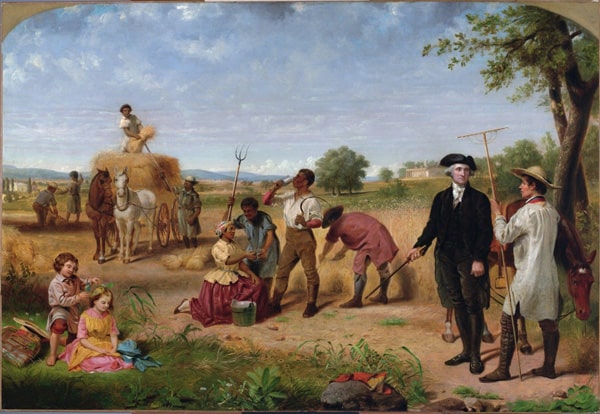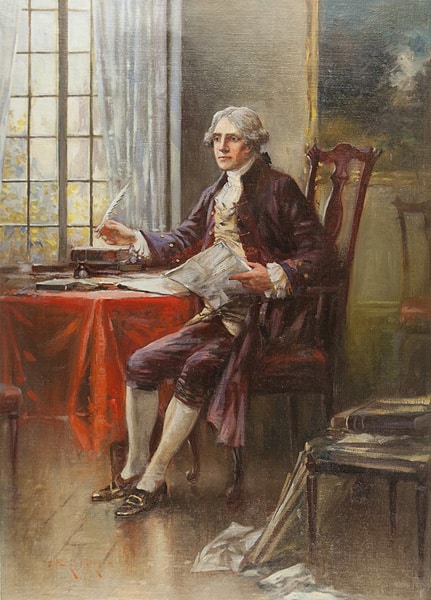‘National Review’ Fails to Defend America — Pathetically
Gregory Hood, American Renaissance, July 10, 2020
National Review is “defending America” in its latest issue. Unfortunately, its cowardice about race makes its defense a laughable failure.
Editor Rich Lowry’s introduction tries to negotiate the terms of surrender. He is appalled to find that “we’ve gone from a debate about the status of Confederate statues to the toppling defacing, and removal of statues of Washington, Jefferson, Lincoln, and Teddy Roosevelt.” It’s way too late to have noticed that. The “slippery slope” may be a fallacy in logic, but it’s the rule in politics. Mr. Lowry also says there were some “potentially worthwhile police reforms” we could be discussing because of the George Floyd case. Why should conservatives discuss reforms at all before the trial of Officer Derek Chauvin?

Contributor Richard Brookhiser says we must understand “America’s Founding.” He argues that egalitarianism is central to both the Declaration of Independence and the Constitution. The ban on kings and aristocracy and the tributes to equality limit power, he argues, because they remove the argument that a “different, superior order of being” can “annihilate another’s” power. He admits that the Founders accepted slavery, though many questioned it and wanted it abolished. However, he is relieved that the Constitution didn’t specifically recognize and sanction slavery.
Mr. Brookhiser concedes that when the Founders said “all men are created equal,” they might have meant “men like themselves — white men.” “This was the argument advanced by racists, south and north in the 19th century,” he writes, “and oddly by BLM protesters today.” He argues that the question was answered “in every generation” by men like Frederick Douglass, Abraham Lincoln, and Martin Luther King Jr. “who asserted that the founding documents were freedom documents, setting a standard against the day when it might be met.”
This is historically illiterate. First, the Declaration had a specific purpose: to justify revolt against the crown. No one, especially not Jefferson, thought it laid out principles of government. Once the Declaration had served its purpose and the United States was independent, the document had no particularly revered place in American mythology. It became a holy relic only later — and only in the minds of strident egalitarians — because of those five fateful words: “all men are created equal.” There is nothing else in it that people care about today.
Second, the Founders clearly didn’t think all groups were equal, which is why they restricted the vote to white, male property owners. They took America’s white identity for granted. Frederick Douglass said in 1852 that the Declaration and the Fourth of July were “yours” (whites) not “mine” (blacks.) Black protesters tearing down Lincoln statues are right when they claim Lincoln was a white nationalist who pushed to expatriate blacks. Opposing slavery for white nationalist reasons made sense to Lincoln and virtually all abolitionists; they didn’t like slavery, but they didn’t want to share the country with blacks. Why anyone evokes Martin Luther King as an authority on anything escapes me, but he was not a Christian in conduct or belief — which matters a lot, since he cloaked himself in spiritual authority. In any case, he didn’t believe in colorblind law and would clearly be on the side of Black Lives Matter today.
Mr. Brookhiser’s argument is not conservative. What kind of conservative claims his nation is based on a dream of equality? There has never been equality and never will be. Since this “standard” can never be met, the nation is forever illegitimate. So long as we don’t have this impossible state of equality, why not dismiss corrupt institutions, flawed heroes, or outdated symbols that don’t meet that standard and don’t appeal to the new, non-white America that clamors so insistently for the impossible? What grounds are there to oppose Black Lives Matter?
Another contributor, David French, says America “has a long history of brutal and shameful mistreatment of racial minorities,” but is still a great nation. Mr. French is on firm conservative ground when he says man is fallen and imperfect. However, he then also praises “universal principles” and a “trajectory” of expanding freedom from beyond “white male property owners” to everyone else. We are told “we have far to go” to cash the “promissory note of freedom” and says “the best part of the American story is yet to be told.” Can he really believe that? This is a magazine that once claimed to be “standing athwart History crying ‘Stop!’”
When will we have finally paid off this “promissory note?” If simple legal equality is the goal, we’ve had that for decades. The regime even discriminates against the whites. If the goal is absolute socioeconomic “equality,” then we’ll have to become communists. Even with the most procrustean egalitarian measures, the country will always need ever more elaborate, preposterous explanations for racial inequalities in a country that already offers non-whites race-based privileges.
Mr. Lowry, Mr. French, and Mr. Brookhiser all implicitly exclude Southerners from the “American story.” Mr. French celebrates the Union Army at Gettysburg and the 54th Massachusetts’s charge at Fort Wagner for their “defense” of the Founding. Blacks were “rising up to seize their inheritance.” Do they believe George Washington, Thomas Jefferson, Patrick Henry, George Mason, or any of the other Founders from the Old Dominion would have sided with Union General George Meade rather than Robert E. Lee? If not, why celebrate one group of slaveholders and condemn another?

“Washington as a Farmer at Mount Vernon,” Junius Brutus Stearns, 1851.
Philip Magness explores some interesting legal ground in “Slavery and the Constitution,” arguing that the Constitution didn’t specifically defend slavery. He says the 1772 case of James Somerset, an American slave who was freed by a British court, set a legal precedent that eventually led to abolition. The Founders’ views on slavery were nuanced and they regarded it, at best, as a necessary evil. The New York Times’s “1619 Project” claims the colonials fought the Revolution partially out of a desire to keep slaves. That is wrong. Britain did not free the slaves in its empire until 1835, and the Founders would have had to be prophets to fight a war to forestall something that was still 59 years in the future.
We get similar silliness in essays on George Washington, Thomas Jefferson, and Abraham Lincoln.
Noemie Emery makes the remarkable claim that Washington was “in his essence a Northerner, one who believed in the egalitarian, freewheeling, immigrant-friendly culture of the Northeast.” He was the “world’s first and only Northern Virginian, which is why we revere him today.” That will be news to historians and, again, implies that the South wasn’t part of America.
Jefferson was a son of the South, but National Review turns him into a champion of the Enlightenment. It praises him for creating the University of Virginia and using the phrase “the pursuit of happiness.” To author Myron Magnet’s credit, he does not concede that Thomas Jefferson slept with Sally Hemings (there is strong evidence that he did not). Mr. Magnet also argues that UVA students who revile him today don’t appreciate what he gave them. Still, these are liberal arguments for defending Jefferson. Given the mischief made with the phrases “all men are created equal” and “the pursuit of happiness,” it would have been better if Jefferson had simply written about “life, liberty, and property.”

Portrait of Thomas Jefferson by Edward Percy Moran, 1916.
Finally, there’s Lincoln. Author Allen Guelzo manages to state the obvious: Lincoln freed the slaves; the slaves didn’t free themselves. “It was actually a surprise to many Northerners that the slaves did not use the Civil War as an opportunity for insurrection,” he wrote, though he explains this by saying slaves were afraid. I’d argue that blacks’ attitude towards abolition may have been more complicated than many believe today; surviving slaves interviewed in the 1920s had positive things to say about slavery. Mr. Guelzo also contradicts himself, arguing that Lincoln was eager to allow freedmen the vote, but also that slave runaways “had no voting rights, and thus no way to influence Lincoln’s decision on emancipation.”
Lincoln was a canny politician. It’s hard to believe he couldn’t predict that freed blacks, if they stayed in the country against his wishes, would become a GOP base in the conquered South. Mr. Guelzo concludes that Lincoln was neither an extreme white racist nor a hapless leader forced into action by blacks’ “self-emancipation:” “If we have lost the mutuality that Lincoln represents,” he said, “we may very well have lost ourselves, black and white, together.” Lincoln was, by today’s standards, a frothing white supremacist, and doing contortions to argue otherwise concedes our argument: The idea of “ourselves, black and white, together” was utterly alien to Abraham Lincoln. Trying to force an artificial identity is futile and tyrannical.
Robert VerBruggen apparently thinks it’s neither futile nor tyrannical. He writes in “On Systemic Racism” that we need to wage “a war on local zoning regulations” to “make it easier for poor families to live in thriving neighborhoods.” (Zoning is not “racist;” it recognizes only that different people want different kinds of neighborhoods.) Of course, once that happens, they probably won’t be “thriving” anymore. We also need “school choice.” And let anyone into private schools? Does Mr. VerBruggen really think this kind of thing will help any more than “midnight basketball” or enterprise zones? Mr. VerBruggen actually says that “address[ing] racial inequities and speed[ing] our agonizingly slow pace of integration” should be “conservative priorities.” Why? What is conservative about forcing people to do things they don’t want to do?
Yuval Levin has some useful things to say in “Immigration and Our National Crisis of Confidence.” He says mass immigration has created pockets of mass ethnic poverty. However, he also says President Trump’s rhetoric is too hard on immigrants. He wants a “compromise” with Democrats on immigration — whatever that might be — rather than immigration law enforcement. Finally, he predicts the COVID-19 pandemic will slow immigration and give us time to debate the issue. That isn’t true. Illegal immigration surged 40 percent in June and could be driving the infection rate in the southwest. Illegals are coming north for COVID-19 treatment. And 1965 is when we really should have debated immigration — honestly rather than in the underhanded way boosters of the Immigration Reform Act slipped it over on us.
In “America, Warts and All,” Joseph Epstein says: “Because of political correctness, one dare not speak the truth about race, not even certain obvious facts: that the wider success of African Americans will come about not by falling back on government programs, or through protests or reparations, but by relinquishing victim status and relying on one’s own efforts — in the same way that any other group in this country has managed to flourish, through strong family ties, hard work, saving, future-mindedness.”
That’s as far as Mr. Epstein manages to get with his “obvious facts” that are truly forbidden. He dares not say that the current status of blacks is what you would expect from racial differences in intelligence. Without affirmative action and other government programs, the black middle class would be smaller, and those programs don’t much help the larger black population. Strict policing, immigration restriction, and social conservatism would probably do them a lot more good. However, Democrats will do them no favors, and Republicans are increasingly afraid to propose anything that would actually help.
Dan McLaughlin defends America for its successful republicanism in his “Exceptional First American Century.” He, too, is defensive about slavery and the “brutal wars against Native Americans.” Mr. McLaughlin praises America because it’s “democratic, republican, liberal, and constitutional.” America’s misdeeds must be understood in historic context. America survived, and so now liberal democracies dot the globe.
However, the reason these National Review essays even had to be written is that American identity is under attack. America’s liberal democratic principles are arguably leading to self-destruction. If that’s so, what good are they? What’s more, if America leads the West and has imposed its principles on other white countries, isn’t America leading our entire civilization to annihilation? If the status quo is where liberal democracy leads, we would have been better off if the first war for independence had failed and the second (for Southern independence) had succeeded.
In essay after essay, “conservative” after “conservative” makes much the same argument: America is worth saving because it advanced classically liberal principles and human equality. However, Thomas Jefferson himself wrote that the world “belongs exclusively to the living,” and so any written constitution or political order can and should be changed every generation. America was a settler colonist state built by exploration, conquest, and war. Why should egalitarians honor that? And why is it the job of conservatives to convince liberals to be patriotic?
The real conservative case for America is simple. We love America because it’s ours. We built it. We live here. We are a race of pioneers, settlers, and conquerors. Our nation existed before the Declaration of Independence, and it will continue to exist if the government in Washington D.C. (or whatever it will be named by then) fails completely. If we have to justify our existence to our opponents, we’ve already lost. If conservatives can’t defend America except in universalistic terms, they were never serious about fighting for it in the first place.

















